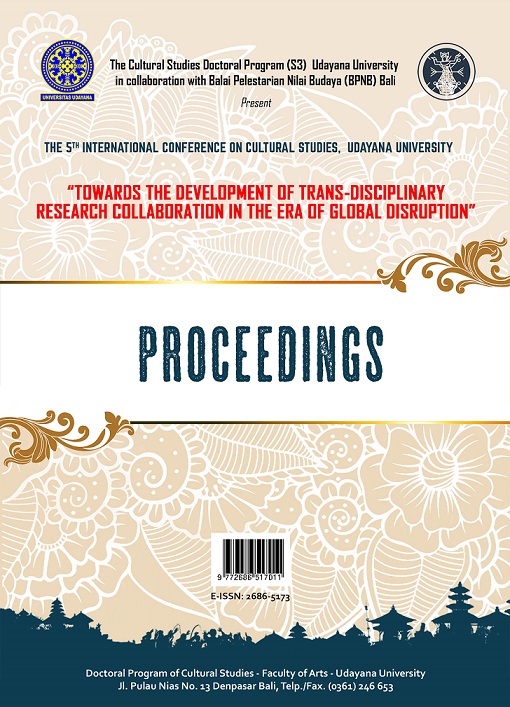EMPOWERMENT OF INDIGENOUS COMMUNITIES AS A STRATEGY IN ACCELERATION OF NATIONAL ECONOMIC DEVELOPMENT
Comparative Study of Balinese, Karo Batakand Dayak Customs
Abstract
Customary-based economic institutions aim to maintain the local wisdom of the community and accelerate national economic development. The economic life of indigenous peoples in Bali has increased through the presence of the Village Credit Institution (LPD). The existence of this LPD is an example of success in empowering indigenous peoples. The empowerment of indigenous peoples is based on the concept that each community member has an obligation to support their respective traditional activities. In getting this LPD capital, the traditional leaders make awig-awig as a basis for collecting donations from people who are entrepreneurs or trade in the customary area. This institution was formed with the aim of making it easy for the community to lend venture capital and the costs of adat activities. With this financial institution, the community has experienced an increase in their economy and welfare. Based on this phenomenon, the problems that will be examined in this study are (1) How does the Balinese Adat Village build its community's economic system? (2) What are the forms of economic institutions of indigenous peoples in Indonesia? (3) What is the economic empowerment model for indigenous peoples as a strategy in accelerating national economic development?In answering the above problem formulation, this research generally aims to produce an economic model of indigenous peoples as a strategy in accelerating national economic development. Specific objectives: To find out how the Balinese Indigenous Village community built their economic systems; to identify the forms of economic institutions of indigenous peoples in Indonesia; and to formulate the economic empowerment model of indigenous peoples as a strategy in accelerating national economic development. To achieve this goal, researchers conducted research on traditional institutions in 3 provinces, namely: Bali, North Sumatra, Central Kalimantan. This location was chosen because the lifestyle of the people is still determined by their respective traditional institutions. This research was started from Bali because the traditional economic institutions have succeeded in prospering members of the community so far. Researchers used qualitative and quantitative descriptive methods (mix methods) with comparative case study research types. Thus, this research is expected to get a model in the context of accelerating national economic development. Data is collected and analyzed by observation, interview, and document. The findings are that the three customary settings between the Batak Karo, Bali and Dayak found that there are similarities in the economic empowerment model of indigenous peoples that are able to meet the desires of each of its members.(1). The way the Balinese Indigenous Village builds the economic system of its people is by strengthening the LPD by collecting contributions from residents of their village. (2) The forms of economic institutions of indigenous peoples in Indonesia are in the form of credit unions (both in the Batak karo and Dayak customs). (3) The economic empowerment model of indigenous peoples as a strategy in accelerating the development of the national economy, namely: 1. Helping troubled members. 2. Helping people who want to grow and try. 3. There are Standard Operating Procedures or SKEMA that must be passed by members in each of these customs. 4. The existence of cheap interest that causes no courage to borrow that can be used for business. 5. There are borrowing conditions set by each institution, but differ in terms of credit services. The conclusion is the existence of customary economic institutions that spur people to improve their economy in order to accelerate the development of the national economy which ultimately leads to the welfare of the lives of its people
Downloads
References
[2] Bigsten A. Determinants of the evolution of inequality in Africa. J Afr Econ 2018; 27: 127–148.
[3] Sabirin. UMKM, MEA, Pembangunan Ekonomi. J Kewirausahaan dan Usaha Kecil Menengah 2016; 1: 41–50.
[4] Todaro M., Smith S. Economic Development. 2012. Epub ahead of print 2012. DOI: 10.1177/089124240001400105.
[5] Pratap S, Quintin E. The Informal Sector in Developing Countries: Output, Assets, and Employment. In: Personal Wealth from a Global Perspective. 2009. Epub ahead of print 2009. DOI: 10.1093/acprof:oso/9780199548880.003.0018.
[6] LeRoy Miller R. Business Law Today: The Essentials. In: South-Western Cengage Learning. 2011, p. 127.
[7] Lambing P dan CRK. Enterpreneurship. New Jersey, USA: Prentice Hall, 2000.
[8] Beets WC. Raising and Sustaining Productivity of Smallholder Farming Systems in the Tropics. Holland: AgBe Publishing, 1990.
[9] Budi SP. Relevansi Dan Aplikasi Aliran Ekonomi Kelembagaan. J Ekon Pembang 2008; 9: 46–60.
[10] Erani YA. Ekonomi Kelembagaan. Malang: Bayumedia Publishing, 2008.
[11] Gamage, H.R. Cameron, D. & Woods E. Are Sri Langkan Entrepeneurs Motivated by the Need for Achievement? In: Presented at the 9th Inter-national Conference on Sri Lanka Studies, 28th – 30th November 2003. Sri Lanka: Matara, 2003.
[12] Saffu K. The Role and Impact of Culture on South Pacific Island Entrepeneurs, International Journal of Entrepeneurial Behavior & Research. 2009..
https://robiatuladawiyah995.wordpress.com/2013/12/10/pengertian-credit-union-cu/
https://www.kompasiana.com/www.yogipusa.com/552a760ef17e61bb10d623be/sejarah-kelahiran-credit-union-cu
http://www.credituniondayalestari.org/page/sejarah-credit-union-dunia
https://id.wikipedia.org/wiki/Koperasi_kredit
http://journal.widyadharma.ac.id/index.php/bisma/article/download/180/179





